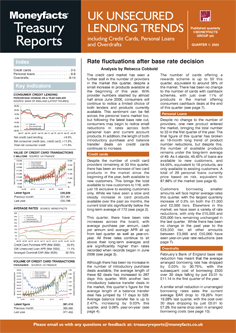Rachel Springall, Finance Expert at Moneyfacts, said:
“Spring can be a time for consumers to clean up their finances and consolidate debts, so it will be welcome news that the number of balance transfer deals and average length of interest-free terms have risen over Q1 2025. The average term on introductory balance transfers has hit an 18-month high, and the number of offers is at its highest since August 2023. However, over the past quarter the average fee on balance transfers has risen and has now sat above 2% for over two years. The rise in terms and options is positive but consumers will need to carefully compare the upfront costs when moving card debts, particularly as some of the lengthiest interest-free terms charge fees of over 3%. Shoppers looking for an interest-free purchase card will note terms are up this quarter, at their highest in over two years, and while the number of options has not increased, the pool of deals is still at its highest level since 2023.
“An unsecured personal loan is a good option for borrowers looking to consolidate debts or make unexpected purchases, particularly if someone needs a clear structured repayment plan. The past quarter has shown a positive decline in average loan rates across various tiers, which has resulted in the lowest rates in over a year for borrowings of £5,000 over three years, £7,500 over five years and £10,000 over five years. However, those looking to borrow a small sum of £3,000 over three years may be disappointed to see the average rate has risen over the past quarter, now standing at its highest point in almost six months. Lenders can change rates not just due to rate adjustments to the Bank of England base rate, but also to follow any future sentiment on interest rates or their attitude to the risk of defaults. According to The Money Charity, the average credit card debt per household in December 2024 was £2,528 and there was a year-on-year rise to outstanding credit card balances. This week marks Debt Awareness Week, spearheaded by StepChange, a debt advice charity, with this year’s theme designed around debt stigma. Consumers would be wise to take this week as a time to consider how they are managing their debts but ensure they speak to their lender or seek advice from a debt charity for support if they are struggling.”
Rachel Springall, Finance Expert at Moneyfacts, said:
“Spring can be a time for consumers to clean up their finances and consolidate debts, so it will be welcome news that the number of balance transfer deals and average length of interest-free terms have risen over Q1 2025. The average term on introductory balance transfers has hit an 18-month high, and the number of offers is at its highest since August 2023. However, over the past quarter the average fee on balance transfers has risen and has now sat above 2% for over two years. The rise in terms and options is positive but consumers will need to carefully compare the upfront costs when moving card debts, particularly as some of the lengthiest interest-free terms charge fees of over 3%. Shoppers looking for an interest-free purchase card will note terms are up this quarter, at their highest in over two years, and while the number of options has not increased, the pool of deals is still at its highest level since 2023.
“An unsecured personal loan is a good option for borrowers looking to consolidate debts or make unexpected purchases, particularly if someone needs a clear structured repayment plan. The past quarter has shown a positive decline in average loan rates across various tiers, which has resulted in the lowest rates in over a year for borrowings of £5,000 over three years, £7,500 over five years and £10,000 over five years. However, those looking to borrow a small sum of £3,000 over three years may be disappointed to see the average rate has risen over the past quarter, now standing at its highest point in almost six months. Lenders can change rates not just due to rate adjustments to the Bank of England base rate, but also to follow any future sentiment on interest rates or their attitude to the risk of defaults. According to The Money Charity, the average credit card debt per household in December 2024 was £2,528 and there was a year-on-year rise to outstanding credit card balances. This week marks Debt Awareness Week, spearheaded by StepChange, a debt advice charity, with this year’s theme designed around debt stigma. Consumers would be wise to take this week as a time to consider how they are managing their debts but ensure they speak to their lender or seek advice from a debt charity for support if they are struggling.”











